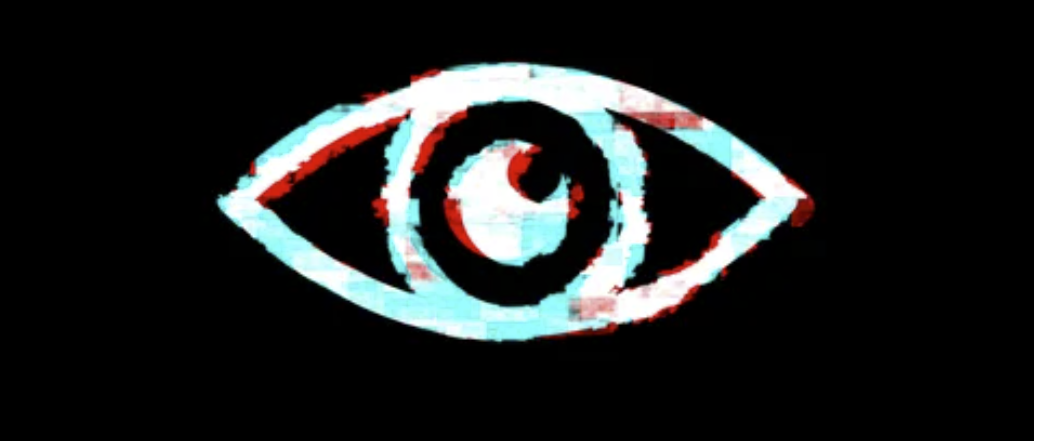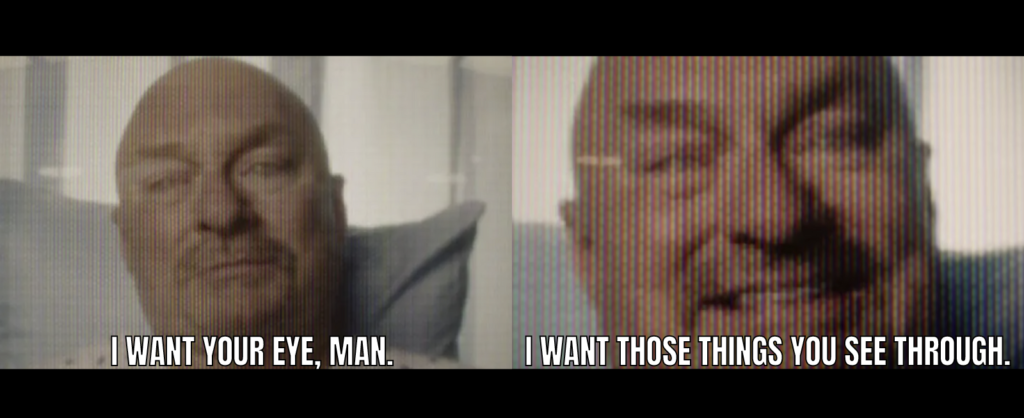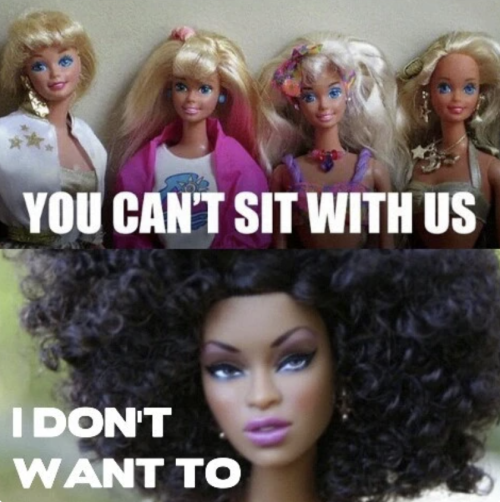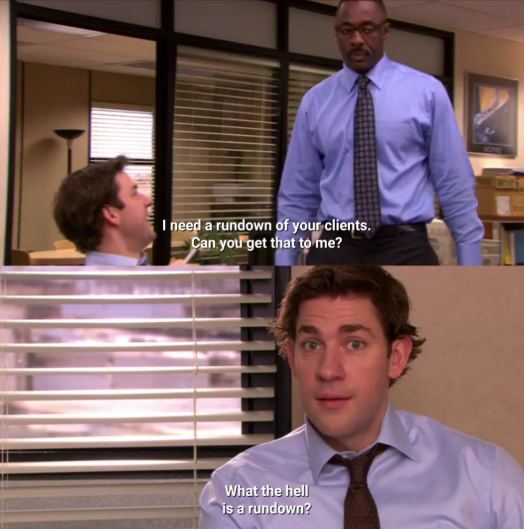Reading Time: 7 mins
Why Are Tech Companies Obsessed With Your Eyes?
I always feel like somebody's watchin' me... 🎵 👀

Imagine you’re on a conference call with 20 people. The screen is packed with floating heads. It’s claustrophobic and glitchy. The typical auditory delay means two people speak at the same time, then apologize, only to do it again. Whoops, ha ha. Just another Monday. 
You’ve got 10 unread emails. 15 open tabs. 5 mins to lunch. Suddenly it’s your turn to speak. Here are your options.
#1. You look at the camera, forget there’s an audience, and do your best “I give a fuck” voice.
#2. You look at the screen, 40 eyeballs scanning your face, and divide your attention as best you can. In a tenth of a second, you notice a nasty side-eye from that one person. Hopefully others caught it, too. Something to talk about at your next “coffee chat.”
#3. You go all in. Your lighting’s enviable, your camera’s high-res, your background screams corporate cubicle-meets-Scandinavian spa. You smile broadly, switching your gaze between camera, monitor, and screen. And you ensure there’s plenty of hand movements because of that HBR tip on how to be more assertive in a virtual meeting. All the while your cat stares in disbelief as she watches your soul leave the room.
No matter what do, you pay a price in the currency of human attention.
Voyeurism in the workplace

No one likes a Peeping Zuck
Think about the evolution of communication technologies over the past few years and the tech sector’s relentless efforts to track your social tendencies, your data, your psychology—your vision.
Watch Satya Nadella, CEO of Microsoft gloss over privacy concerns about the company’s Recall feature taking screenshots of everything users do on their computers. Recall later received enormous backlash for being “a security disaster.”
Is it any surprise that Marc Zuckerberg’s latest innovation involves Ray-Ban glasses — literally giving Meta a window into the world through your eyes? Or that Worldcoin, co-founded by OpenAI CEO Sam Altman, is trying to normalize an eyeball-scanning orb that was banned in Spain over privacy concerns and accused of gathering data on minors and not allowing people to withdraw consent?
Seriously, you can’t make this up.


Get Out, 2017 (Universal Pictures)
Watching and being watched
When the camera zooms in, your face becomes the stage. It reveals things about you that you're not even aware of.
Do this often enough, and you get a bizarre work culture that rewards on-cam performance over off-cam productivity. A culture that works in subtle and insidious ways to keep you watching and reacting when you should probably stop, process, and look away.
The emphasis on “visibility” and the idea of “always being in sight” is a rule that ultimately favors narcissists and self-serving individuals with little to no empathy as it encourages them to do what they do best: make sure all eyes are on them.
In an effort to boost our “visibility,” we demystify our private experience and focus more on affective labor, encouraging others to do the same. Suddenly we care more about acting perfect for the camera and making people react in a way that’s noticeable to others, rather than adding real value to the discussion, challenging ideas, and asking incisive questions to create a meaningful product or improve service (aka doing our actual jobs).
We know this about social media platforms like Instagram. But throw in money and power into this voyeuristic office mix and you create a dangerous work environment that not only enables but rewards narcissists for being more visible—which somehow becomes synonymous with “success.” Take it from a clinical psychologist…
“They’re hitting metrics because of their narcissism, because they’re willing to steal other people’s sales leads, because they’re willing to bend rules to make sure things get done by a certain date, because they’re willing to be abusive toward their own team to get a deadline met. This isn’t exactly the stuff of dreams in the workplace.”
Dr. Ramani Durvasula, clinical psychologist and author
(Sound like someone you know?)
Is it any surprise that the “most watched person in the world” aka the world’s biggest YouTuber (with an estimated net worth of $500 billion) is now facing serious accusations, including but not limited to creating unsafe working conditions, manipulating and mistreating a team member for views, and allegedly hiring a registered sex offender for a channel viewed predominantly by a young audience?
But that's just YouTube... right?
The battle for more eyeballs isn’t exclusive to video-sharing platforms. It goes on in ad agencies, social AND professional networking platforms like LinkedIn, tech companies, app stores, and basically any revenue-driven business with a marketing and sales division. More views = more profit.
Ugh, we know that already.
Yet we often forget that this growing obsession with optics also affects internal workplace culture. In addition to enabling and rewarding narcissists, it perpetuates a culture of self-censorship and conformity as likability is determined by “views,” emojis, likes, reactions, and comments rather than originality of ideas or boldness of thought. In short:
It’s a popularity contest, which means who you work with is as important as who you work for. PSA: If you work with a bunch of suck-ups, being unpopular is probably a good sign… 🤟

This shapes our reality in ways we don’t think about. What happened becomes less important than who saw it and engaged with it. Which is in turn determined by algorithms dictated by a trillion-dollar corporation with “a 90% market share in online search.”
As journalist Amanda Chicago Lewis observes: “At the end of the day, it’s Google’s world, and the SEOs are only living in it.”
To add to this politics of distraction, we’re conditioned to split our attention all the time. Between actor and audience, texting and talking, personal and professional life, meaning we’re not fully attentive or loyal to either. Think about this in the context of work. You’re less likely to critique someone’s shitty and obtuse presentation when senior leaders are visibly nodding along with their crap. You’re less likely to “raise your hand” to ask a clarifying question when the chat is filled with admiration for the new guy.

Worst of all, we’re conditioned to choose performativity and self-exposure over honesty and critical thinking. Because what is said becomes less important than the fact that you’re on display. It’s all about keeping up with the Joneses, except now you’re comparing who you are in person to who you are on camera. It all happens in the intimacy of our own home, complete with a camera and microphone.
This isn’t an accident. It’s by design. Your eyes are their moneymakers. So… what are you watching?
***
